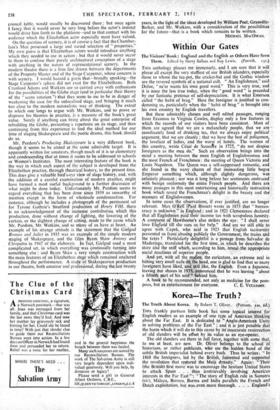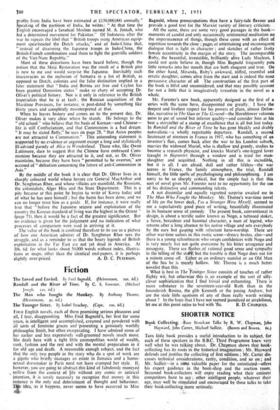Korea—The Truth?
The Truth About Korea. By Robert T. Oliver. (Putnam.. jos. 6d.)
THIS frankly partisan little book haS some topical interest for English readers as an example of one type of American thinking about the Far East. It is dedicated to ." Anglo-American Unity in solving problems of the Far East " ; and it is just possible that the harm which it will do to this cause by itS inaccurate resurrection of old slanders will be offset by its value as an eye-opener. The old slanders are there in full force, together with some that, to me at least, are new. Dr. Oliver belongs to the school of historians, or rather publicists, who see the. hidden hand of the subtle British imperialist behind every bush. Thus he writes: " In 1868 the foreigners, led by the British, fomented and supported the revolution that restored the Meiji dynasty." Again: " Their (the British) first move was to encourage the hesitant United States to attack Spain . . . thus irretrievably involving American interests in the Far East "-; "'The story of English rule in Sumatra (sic), Malaya, Borneo, Burma and India parallels the French and Dutch exploitation, but was.even more thorough. . . . England's
profits from India have been estimated at £150,000,000 annually." Speaking of the partition of India, he writes: " At that time the English encouraged a fanatical Moslem named M. A. Jinnah, who led a determined movement for Pakistan." Of Indonesia after the war he repeats the libel that " British troops using American equip- ment spearheaded the Dutch attacks," and of Indo-China that, " instead of disarming the Japanese troops in Indo-China, the British-French combination used them to fight the guerrilla soldiers of the Viet-Nam Republic." Most of these distortions have been heard before, though the notion that the Meiji Restoration was the result of a British plot is new to me and would surprise the Japanese. Inevitably such inaccuracies as the inclusion of Sumatra in a list of British, as opposed to Dutch, colonies and the false distinction implied in a later statement that "India and Burma are free and Ceylon has been granted • Dominion status " make us chary of accepting Dr. Oliver's political history. Nor is it only in reference to the British imperialists that he is at fault ; the Russian acquisition of the Maritime Provinces, for instance, is post-dated by something like thirty years and completely misinterpreted at that. When he leaves history and comes on to the present day, Dr. Oliver makes it very clear where he stands. He belongs to the " old school " who believe that the basis of Korean—and Chinese— life is still Confucianism, and that Communism is a bad dream. " It may be stated flatly," he says on page 28, " that Asian peoples are not attracted to Communism." This astounding statement is supported by no evidence or argument except a long and stylistically Ill-advised parody of Alice in Wonderland. Those who, like Owen Lattimore, dare to suggest that the Chinese have embraced Com- munism because they are attracted to it, and not, as Dr. Oliver maintains, because they have been " permitted to be overrun," are accused of " defeatism concerning the future of anti-Communism in Asia."
By the middle of the book it is clear that Dr. Oliver lives in a sharply coloured world whose heroes are General MacArthur and Dr. Synghman Rhee, and whose villains are manifold, the Russians, the colonialists, Alger Hiss and the State Department. This is a pity because at this point he begins to write of Korea today and of what he has seen himself ; but the harm has been done, and we can no longer trust him as a guide. If, for instance, it were really true that " before the Japanese seizure and exploitation of the country the Korean standard of living was the highest in the Orient " (page 71), then it would be a fact of the greatest significance. But no evidence is given for the judgement and no indication of what processes of comparison were used in arriving at it. The value of the book is confined therefore to its use as a picture of how one American admirer of Dr. Synghman Rhee sees the struggle, and as a reminder to us that the hoary legends of British exploitation in the Far East are not yet dead in America. At 10s. 6d. for what looks about 50.000 words without index, illustra- tions or maps, other than the identical end-papers, it is perhaps



































 Previous page
Previous page